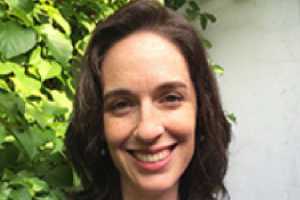
Michelle Quigg is the Roster Coordinator for Access Pro Bono and an immigration lawyer whose most recent work has been with stateless clients. She is passionate about increasing access to justice, particularly as it relates to helping individuals who have fallen through the cracks of Canada’s immigration, refugee and citizenship system. She provides pro bono services to individuals and to Battered Women Support Services (BWSS). Together with her husband, Michelle has two wonderful children.
What inspired you to go to law school?
I've always been interested in current events, international affairs and people. Reading the newspaper and a biography would be my ideal Sunday afternoon. Law seemed like an exciting way not to simply consume these interests, but to engage in them in a meaningful way. Also, law's broadness appealed to me. I'm not one of those people who has known what she wants to do since age five. Law aligned with my interests and seemed like the answer to my fear of commitment.
What was your most memorable moment during law school?
I have a collection of memorable moments. I remember bolting out of the law school half way through my first year property law class and beelining to the Careers Center because I had this overwhelming feeling of “What am I doing here?” I'm grateful I stayed in law school, but there were many moments of doubt in first year. I remember Professor Wexler serenading a tree with his mandolin. I remember feeling 'this is why I'm here' in Professor (now Dean) Dauvergne's Immigration Law class and during my time at the First Nations Legal Clinic, which was an unparalleled learning experience.
What motivates you to do the work you do? What inspired you to start working with immigrants, refugees, and now stateless people?
I'm motivated by my clients whose struggles over adversity are nothing short of heroic and I'm motivated to increase access to justice because without access there is no justice. I've always been drawn to immigration and refugee work because of being surrounded by immigrants and refugees and their stories from a young age. My mom is an immigrant from Colombia and taught ESL for decades. I was raised not to be sheltered from the world, but to engage in it. This engagement is a good antidote to despair. My work for stateless clients began when I heard about the Lost Canadians and was shocked to learn that there are people who have lived all or most of their lives in Canada, but are still stateless for a variety of reasons beyond their control (e.g. No birth registration for fear of being taken to a residential school in the 50s, unregistered home birth, etc.). I think immigration, refugee and statelessness-related issues resonate deeply because the need for safety, the search for a better life and the need for belonging to access basic rights like the right to work and have medical care are so fundamental to the human experience.
What inspires you to work with Access Pro Bono and do so much of your own pro bono work?
Law is a language and legal training gives you a voice that’s heard by the systems of power in our society. Doing pro bono work, and connecting people to other lawyers doing pro bono work, allows me to use my voice in service of people who are frequently ignored because they can’t access our justice system for financial reasons. It’s incredibly rewarding and meaningful work. The justice system is supposed to be this great equalizer in society premised on the idea that no matter who you are and what your income is you have the ability to protect your rights. Unfortunately, we’re far from that ideal with the woeful underfunding of Legal Aid in BC. Lawyers doing pro bono work, be it through the Access Pro Bono Society of BC or independently, are critical in helping people to avoid being evicted from their homes, get child support for their kids and with a myriad of other issues that couldn’t be more important to people’s lives. Access to justice shouldn’t be left to lawyer charity that can only fill a small portion of the unmet need, but unfortunately that’s the reality we live in right now.
What do you feel are your biggest accomplishments to date?
Getting people permanent status in Canada be they refugees or stateless people. No one case feels like a bigger accomplishment than any other, because despite some cases being more uphill battles, at the end of the day a positive result is as big for one person or family as it is for another. For people who have been through hell and back to be told that they finally have a safe and permanent home is life changing. It’s a privilege to be a part of making that happen.
What do you still have on your 'to-do list'?
I want to work more on statelessness cases. Our current system is inadequate in dealing with the situations of people who through no fault of their own are denied their rights as human beings because they don't 'exist' on paper as belonging to any country. Getting status as a stateless person is a bureaucratic nightmare. Not just using law, but making new laws to address this is something I want to continue to be a part of.
What do you do in your free time?
Wish I was napping. With two lovely and very energetic young kids I spend a lot of time coveting more rest.